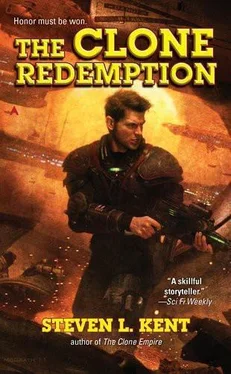Steven Kent - The Clone Redemption
Здесь есть возможность читать онлайн «Steven Kent - The Clone Redemption» весь текст электронной книги совершенно бесплатно (целиком полную версию без сокращений). В некоторых случаях можно слушать аудио, скачать через торрент в формате fb2 и присутствует краткое содержание. Жанр: Боевая фантастика, на английском языке. Описание произведения, (предисловие) а так же отзывы посетителей доступны на портале библиотеки ЛибКат.
- Название:The Clone Redemption
- Автор:
- Жанр:
- Год:неизвестен
- ISBN:нет данных
- Рейтинг книги:4 / 5. Голосов: 1
-
Избранное:Добавить в избранное
- Отзывы:
-
Ваша оценка:
- 80
- 1
- 2
- 3
- 4
- 5
The Clone Redemption: краткое содержание, описание и аннотация
Предлагаем к чтению аннотацию, описание, краткое содержание или предисловие (зависит от того, что написал сам автор книги «The Clone Redemption»). Если вы не нашли необходимую информацию о книге — напишите в комментариях, мы постараемся отыскать её.
The Clone Redemption — читать онлайн бесплатно полную книгу (весь текст) целиком
Ниже представлен текст книги, разбитый по страницам. Система сохранения места последней прочитанной страницы, позволяет с удобством читать онлайн бесплатно книгу «The Clone Redemption», без необходимости каждый раз заново искать на чём Вы остановились. Поставьте закладку, и сможете в любой момент перейти на страницу, на которой закончили чтение.
Интервал:
Закладка:
We climbed onto the sled, Freeman driving. Freeman always drove. A moment later, he had the boosters fired, and we hovered down the ramp at the rear of the transport, traveling at the sled’s top speed of ten miles per hour.
And there was the spy ship, long and gray and sleek, little bursts of air emanating from her many wounds. Parts of the ship had gone dark, but light showed from some of her viewports.
Ahead of us, the team of engineers assigned to open the ship approached the hull on a sled as well. They drifted along the fuselage, finally stopping behind the darkened maw of the bridge. They worked quickly, using a laser saw to slice a five-foot hole into the side of the ship.
Had the debris we fired at the spy ship not already lacerated her hull, that door would have exploded from the ship in a pressure-blasted burst of oxygen; but any atmospheric pressure had already leaked out.
“Now we know how we’re going to get in,” I told Freeman.
He puttered our sled toward the hole. As we drew nearer, the spy ship no longer looked so remarkably small. She was three stories tall. I reached out an armor-covered hand and ran my fingers along an undamaged stretch of hull as we pulled up to the opening.
For his purposes, Freeman only needed to salvage a specific communications computer; but I wanted the entire ship. My goals were more military-minded. I would not throw away a ship that was both invisible and self-broadcasting no matter how damaged.
Under normal circumstances, Freeman and I would have used particle-beam weapons when entering a disabled ship. This time we brought fléchette-firing S9 stealth pistols. He was concerned about a communications computer; I worried about everything else. Lieutenant Mars would need to fix everything we broke if we ever planned to fly this ship. Hit a computer or a circuit panel with a fléchette, and you may get lucky. The dart could pass through without hitting vital organs. Anything hit with a particle beam would end up a pile of molten metal.
Using a magnetic clamp, Freeman anchored our sled to the hull of the ship, and I launched myself in through the door. Emergency lights flashed along the ceiling of the mostly darkened main corridor. This was the spine of the ship, a hall that led from the bridge to the galley.
When the hull of a capital ship is punctured, emergency bulkheads slide into place to prevent the depressurization from shooting sailors into space. In theory, the bulkheads created pressurized safety compartments in which sailors could wait for the atmospheric pressure to stabilize. In practice, the bulkheads created death chambers. Sometimes, sailors got lucky, and the bulkheads sealed them into compartments with armor or rebreathers. Usually, they didn’t. The bulkheads opened once the atmosphere equalized, which meant that someone had patched the holes or that the atmosphere had bled out completely.
If the emergency bulkheads were still in place, we might find crew members trapped in the various compartments. If they had already retracted, we might run into armed sailors hoping for a little revenge.
Using night-for-day vision, I looked toward the bridge. Cruisers don’t really have bridges; they have oversized cockpits. I saw no signs of life. I looked toward the aft of the ship.
“The emergency doors have retracted,” I told Freeman, Mars, and Cutter on an open frequency. The ship would need extensive repairs. We’d miscalculated the damage when we set the trap, and we did not have a working shipyard for making repairs. I began to have doubts about Lieutenant Mars’s ability to resurrect this spy ship.
Freeman drew his pistol as he entered the ship. His desire to save lives en masse would not prevent him from killing anyone who got in his way. He floated through the hole like a ghost passing through a wall. “Any signs of life?” he asked.
“Not on this deck,” I said.
There were a couple of bodies, men iced up like statues. The smaller debris must have flushed out through the holes. Looking down the hall, I saw empty floors and battered walls.
“Do you have any idea where they stowed your computer?” I asked.
Not much of a conversationalist, even in the best of times, Freeman said, “Second deck.” I should have guessed as much. The Unifieds usually housed the spy gear and communications equipment on that deck.
“Are we looking for anything in particular?” Ships like that one might have a thousand different computers on board.
“It might be attached to a broadcast apparatus,” he said.
“A broadcast computer? You’re looking for a specking broadcast computer?” I asked. In my experience, broadcast computers were strictly navigational tools, and they were big.
“Not the main broadcast engine. This will be attached to a small, secondary broadcast engine.”
That made sense. The Mogats, an extinct band of terrorists who had plunged the Unified Authority into a costly civil war, established a pangalactic communications network using ships equipped with tiny broadcast engines to route their signals.
We might have knocked out the spy ship’s air and lights, but her gravity generator still worked. We were standing, not floating above the floor.
“This wreck may be beyond repair,” said Freeman.
I had the same fear. Deployed properly, a ship like this could turn the course of a war. I was just about to tell Lieutenant Mars to send over some engineers when I glimpsed the glow just beyond the next bulkhead.
“There’s a live one,” I told Freeman, not that he needed the heads-up. Always aware of everything around him, Freeman held his S9 out as he moved to cover.
In a calm voice, he said, “Shielded armor.” He did not say “damn shielded armor” or “specking shielded armor,” just “shielded armor,” because he seldom wasted time assigning values and judgments.
The bastard walked right up the hall showing no fear at all. He might have been a Marine or sailor, but he was wearing the shielded combat armor of a Unified Authority Marine, the new shielded armor that the Unified Authority created after expelling us clones from its military. Knowing that we had no weapons that could penetrate his ethereal electromagnetic coat, the cocky son of a bitch walked right up to the hole we had created as an entrance and casually surveyed the area.
I hid behind a storage locker. Freeman knelt beside a desk.
The man did not carry a gun. The shielding prevented him from holding external weapons. That did not leave him unarmed. A fléchette-firing tube ran along the top of his right sleeve.
I needed a better hiding place. If the bastard spotted me, his depleted uranium fléchettes would cut through the locker, through me, and probably through the bulkhead behind me as well. Even a shot through the arm would be fatal since the fléchettes were coated with a neurotoxin.
“Get ready to run,” I told Freeman. “I’m going to hit him with a grenade.” The shrapnel would not penetrate his shielding, but the percussion from the blast would still knock him on his ass.
Freeman did not respond.
Scanning the cabin, his right arm out straight and slightly bent at the wrist, the man zeroed in on my hiding spot without seeing me. The bastard probably was a Marine, but a new Marine. It was hard to believe what passed as a Marine in the Unified Authority military.
In a situation like this, a real Marine would have shot first and checked later. This guy lacked that kind of instinct; but dressed in combat armor and waving a fléchette gun, he was still dangerous. I’d seen armor like his in action. The fléchette gun could fire thirty shots per second. The darts were tiny splinters. He probably had a thousand rounds packed in a pocket on his sleeve.
I made ready to throw my grenade.
Читать дальшеИнтервал:
Закладка:
Похожие книги на «The Clone Redemption»
Представляем Вашему вниманию похожие книги на «The Clone Redemption» списком для выбора. Мы отобрали схожую по названию и смыслу литературу в надежде предоставить читателям больше вариантов отыскать новые, интересные, ещё непрочитанные произведения.
Обсуждение, отзывы о книге «The Clone Redemption» и просто собственные мнения читателей. Оставьте ваши комментарии, напишите, что Вы думаете о произведении, его смысле или главных героях. Укажите что конкретно понравилось, а что нет, и почему Вы так считаете.












